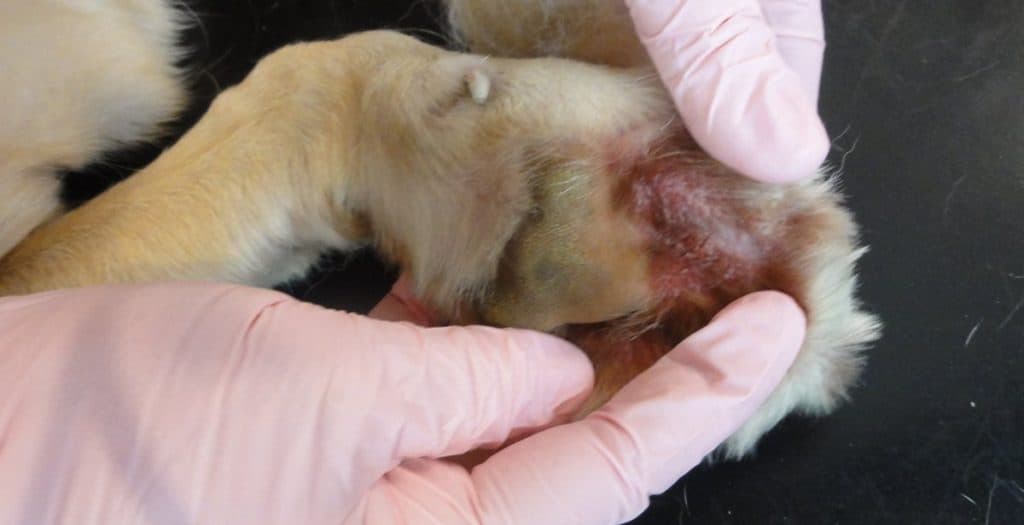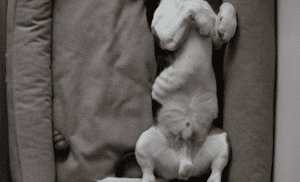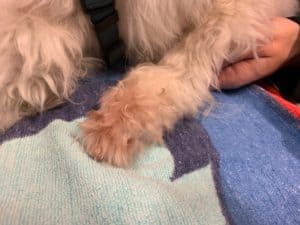Pet owners try their best to ensure their dogs are healthy and happy. A dog with itchy lips and mouth may be a mild but persistent problem that leaves the owner puzzled. At other times, dogs may show frantic scratching of their lips and muzzle.
They may even cause damage to the skin around their mouths when their nails scrape up the skin.
Dogs with itchy lips and mouths may be suffering from an allergy. The allergy could be related to diet or environmental factors. Insect stings are common on the muzzle and will cause scratching. Other factors could include some diseases such as lupus.
Whether your dog has mild or severe symptoms, it is vital to get to the bottom of muzzle scratching.
Dogs With Itchy Lips and Mouth
Dogs explore with their noses. The result is that their muzzles are poked into every environment they find interesting.
This habit could lead to exposure to environmental factors such as pollen, grass, and burrs which will irritate the skin on the muzzle. The reaction will be worse if the dog is prone to allergies.
When dogs eat, their lips and mouth are obviously exposed to the food. If the dog has a dietary allergy, there will be topical exposure to the allergen. The offending ingredient is in direct contact with the skin and causes itching.
Dog Scratching Mouth And Licking Paws
Dogs with food allergies have generalized skin inflammation. Typical intensely itchy sites include the muzzle area, feet, armpits, and ears.
Pododermatitis refers to inflammation of the skin on the feet. This may be the result of various conditions, including allergies.

When dogs have environmental allergies, the undersides of their feet become inflamed and raw. This condition is known as contact pododermatitis. Secondary bacterial and fungal infections may occur.
The dogs lick and scratch their feet, including the area between their toes, exacerbating the condition. The fur on the feet becomes stained from the saliva and is typically a reddish-brown colour.
Dogs that show excessive itching and hair loss around the muzzle may be experiencing plastic bowl allergies. Allergy to plastic is not common in dogs. When it does occur, it is severe with rapid deterioration and skin trauma in the muzzle and facial areas.
Dog Skin Irritation Around Mouth Treatment
Itching of the lips, mouth, or muzzle in a dog needs treatment. Even if the condition appears mild, the dog will scratch, which can cause skin trauma resulting in scarring and potential secondary infections.
If the skin irritation occurs from allergies, the veterinarian and owner must work together to determine the cause of the allergies. An important clue is whether the itching is seasonal or constant.
Seasonal irritation is more likely from environmental allergens such as grass or pollen. Constant itching may be from a food allergy or a continuously present environmental allergy such as house dust.
Allergies are addressed with several different strategies depending on the cause. If it is possible, exposure to the allergen is reduced. This approach is most manageable when the allergen is a dietary factor.
Exclusion diets allow the veterinarian and owner to determine which ingredients are causing the allergy. A diet is formulated or chosen which removes the component, and the dog’s symptoms dissipate.
If the allergen is environmental, limiting the dog’s exposure to it can be more challenging. In this case, the best approach is the medical management of the allergy. A veterinarian will advise on the appropriate course of treatment to manage the allergy.
Medications For Treating Itchy Muzzles In Dogs
Topical applications of creams or lotions on the dog’s lips and muzzle are not practical as the dog usually licks them off. This could be potentially harmful as these medications are only for external use.
Veterinarians generally prescribe systemic medications to reduce the inflammation and irritation caused by the allergy. These include:
- Antihistamines
- Corticosteroids
- Apoquel
- Cyclosporine
Dog Scratching Inside Of Mouth (Itchy Gums)
A dog scratching the inside of its mouth may be experiencing an allergic reaction from topical contact with an allergen.
Allergy reactions on the sensitive oral tissues may cause ulcers and open sores. The pain may cause the dog to scratch even more.
Dental problems and fungal infections (thrush) in the mouth can cause oral discomfort and itching. It can be challenging to examine your dog’s teeth closely, and you will need a veterinarian to perform an examination.
Thrush, also known as candida, is often accompanied by white spots on the gums and tongue. It is a painful condition that should be treated promptly by a veterinarian.
Dog Frantically Pawing At Mouth (Other Reasons Than Itching)
Besides allergies, there are many reasons that a dog may frantically paw at their mouths. It is important to react promptly if a dog displays this behaviour.
Bones And Foreign Bodies Cause Mouth Pawing
A common cause of a dog pawing at his mouth is because of a bone or foreign body stuck in somewhere in the mouth. The object may be jammed across the palate, wedged in by the teeth.
Bones and sticks may become lodged in the teeth. The dog becomes frantic, trying to remove the offending object.
Restrain the dog and open the mouth to examine it. Carefully inspect the entire mouth and throat. If you can safely remove the foreign object, do so but ensure you do not accidentally drop it down the dog’s throat when you are removing it.
A potentially life-threatening situation could be if the dog is choking on a ball or other object. This will need prompt action to save the dog. You may need to do the Heimlich manoeuvre on your dog to dislodge the object.
Caustic Substances From Plants Cause Mouth Pawing
Many plants contain toxic or caustic substances such as oxalates that cause intense burning in the mouth if eaten or bitten. Examples are lilies, elephant ears, and dieffenbachia.
These plants cause intense pain, which will cause the dog to paw at its mouth. Rinse the mouth with running water thoroughly without allowing any water to go down the dog’s throat. Contact your veterinarian for advice as some plants are fatally toxic to dogs.
Insect Stings Cause Mouth Pawing In Dogs
As mentioned earlier, dogs love to inspect everything with their noses and mouths. Dogs are often stung by insects or bitten by spiders and snakes in their mouths or on the muzzle.
Insect, spider, and snake bites are usually accompanied by swelling and sometimes salivation, depending on the bite site. Insect bites may be treated at home by icing the area and giving vet-approved painkillers and antihistamines.
A veterinarian should always see spider and snake bites. Any excessive swelling should also motivate owners to consult a veterinarian as it could compromise respiration.
Another favourite pastime of dogs is licking frogs. Many frogs have toxins they secrete from their skin when they are threatened. The toxins range from mildly caustic to deadly toxins. It is best to be safe and contact your veterinarian for advice.
Lupus Can Cause Muzzle Irritation
Lupus is an autoimmune condition affecting the connective tissue in the body. The face in the area of the muzzle and eyes is a typical area that is compromised. It can cause intense itching resulting in the dog rubbing his muzzle and face on objects or pawing at it.
A knowledgeable veterinarian must diagnose lupus. Treatment is chronic and must be carefully monitored.
Anxiety Can Cause Facial Scratching In Dogs
Dogs can become anxious due to separation anxiety, noise phobia, or environmental stressors. Anxiety can present in various ways, but one of the forms is facing scratching and obsessive paw licking.
The more severe the dog’s anxiety, the worse the licking and scratching. Ideally, the stressors should be addressed, and the dog’s anxiety treated by behavioural modification and environmental management. There are occasions when medication is needed to relieve the dog’s stress.
Lip Fold Dermatitis Causes Muzzle Itching
Lip fold dermatitis is a condition that occurs when the deep folds in the lips become infected. The infection usually results from food and moisture that remains in the folds allowing bacterial and fungal infections to develop.
A characteristic foul odour is associated with lip fold dermatitis. Once smelled, it is not easily forgotten. As one veterinarian described it “smells like death.” Fortunately, lip fold dermatitis is easily managed with regular cleaning and the application of topical creams when it flares up.
Surgery to reduce the depth of the lip fold is available if the condition is not controlled conservatively. The surgery is minor, and there are minimal associated risks.
Dogs with heavy lip folds include spaniels, bloodhounds, Neopolitan mastiffs, bassets, bulldogs, and Sharpei, among others.
Conclusion
Itching lips and mouths in dogs should be investigated. It is distressing to the dog, and treatment can improve the dog’s life quality by reducing irritation. In some instances, a dog pawing at its mouth could indicate choking or other life-threatening conditions, and prompt action is needed.





